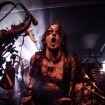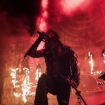"I finally feel like I'm home," exclaims Watain vocalist-bassist Erik Danielsson, as he looks around tattoo artist Paul Booth's Last Rites Gallery in midtown Manhattan. The Swedish black-metal firebrand had spent his previous day in New York visiting radio stations in corporate skyscraper offices, feeling like a "pirate in an opera house," but amidst the grotesque paintings and sculptures and the buzzing needles of Last Rites, he feels more comfortable. As we look at one painting of a voodoo priestess, housed in a frame bearing hundreds of nails—part of an especially creepy zombie-themed exhibition—the singer talks about how he has always found South American voodoo fascinating and genuine. Corpse-paint-less and clad in his street clothes, which includes a black leather Watain jacket and a runic Watain pendant, Danielsson looks around at the various depictions of zombies, takes in the general horror-movie feel of Last Rites, and exhales in contentment. "I'm serious," he tells Revolver. "This is how my studio looks back home."
As we walk around, and Booth gives Danielsson a tour of his private studio, which contains skulls the singer admires, it seems like the perfect setting in which to interview the frontman of one of extreme metal's most gruesome and controversial bands. Since 1998, Watain have released numerous gritty black-metal records, all imbued with Danielsson's devil-worshipping lyrics. And in that time, their concerts have become the stuff of legends. Danielsson and his bandmates cover themselves in putrid, rancid blood, wear clothing that they buried in some Swedish cemetery, and dress their stages with the skulls of real animals. They call their concerts "rituals," part of how they communicate with the devil, and Danielsson says it is his and his bandmates' goal to sicken audiences as they "make holes in the veil" that separates the physical world from the spiritual.
Now, they're celebrating the past 15 years in the title of their new and fifth album, The Wild Hunt. "We've always related a lot to the hunting concept," Danielsson says, after we've retired to a part of the gallery decked out in red-velvet church pews and adorned with a hanging (fake) corpse of a woman. "Whatever we were doing, we're always on the hunt with spears in our hands saying let's fucking do this. It's our hunt for freedom, for liberation. It's been a wild fucking hunt."
The quest began when the three core members of Watain—Danielsson, guitarist Pelle Forsberg, and drummer Håkan Jonsson—first came together as teenagers in Uppsala, Sweden, a town of about 150,000 that is known primarily for housing Scandinavia's largest church and for being the birthplace of movie director Ingmar Bergman. The trio found each other at a bar where the frontman says all the "skinheads, punks, and hard rockers" hung out. "We were pretty much the only three people with Bathory logos painted on our jackets," he says. "We realized very quickly that we shared a very severe serious attitude towards black metal, which in that town was pretty uncommon. This was in 1998, so it was around the time black metal was in a state of total decline. The biggest bands were Dimmu Borgir and Cradle of Filth. Things had just gone a bit haywire. I think Watain, in hindsight, was a counter reaction to those bands. We really wanted to bring back what we had been taught was the real black metal: very centralized around Satanism, very outspoken, and very extreme. We were serious."
For inspiration, the group looked to the "real black metal" bands that had seemed to fizzle out in the mid '90s, whether due to inactivity or imprisonment, such as Dissection, Mayhem, Bathory, and, "of course Venom." They took their name from a song by cult first-generation black-metal group Von, who shocked San Francisco in the mid '80s with stages adorned with inverted crosses and bloody stage gear. Following in these provocateurs' bloody footsteps, Watain went about crafting a similar stage show—though Danielsson clarifies to that what Watain does onstage "is not entertainment"—that evolved in unpredictable ways.
"The rotten blood and decayed stage clothes, these were things that really unintentional," Danielsson says. "We were offered to go on tour with Dissection, one of the most important bands for us. We wanted to make sure we were set for the tour. We knew we had to remember to bring blood and looked at how many dates we were doing. 'Thirty-seven dates. OK, we need a liter per show. Just get 100 liters.' We kept it in the back of the bus and it was pretty warm. Things started to decompose and become putrid. Then, because of the putrid blood, people were vomiting in the audience and we were vomiting onstage. It's perfect! Why haven't we thought of that before?"(Incidentally, when Revolver asks just how Watain came to possess "too much blood" in the first place, Danielsson solemnly replies, "We acquired it," as if to say, "Don't ask.")
In the year the group formed, they released their debut demo, which bore a title meant to incite: Go Fuck Your Jewish "God." Since then, Danielsson has dismissed that release—not for the title, but for the production values. But he does want to clarify that Watain are not Nazis. "We've always been so extremely unpolitical and completely uninterested in any of that," he says. "I think people are always looking for the real devil in Watain. Once they see that title, they say, 'OK, it's that. Fuck you, you're a Nazi. Yeah, great."
But despite their questionable seminal works, the group found its footing and mostly embraced Satanism as its main lyrical theme both on the band's first full-length, Rabid Death's Curse. Danielsson feels Watain came into their own, though, on 2003's Casus Luciferi, when the group's black-metal approach became more visceral. "Satanism as a religion is all about avoiding stagnation," he explains. "We burst forth at all times without any consideration whatsoever. That's what we do."
As the group's violent presence developed onstage and on record, it grew offstage as well. "We were in fights every week," Danielsson says. "A juvenile delinquent scenario every weekend. We used to like to fight. We just liked the intensity of it. We liked the feeling of being beaten up. There was a lot of fighting and setting things on fire, kicking things over. General debauchery. The whole Watain reputation began there. When we started playing shows in Stockholm, we realized our reputation had already gone before us."
As Danielsson recalls his harrowing halcyon days, Revolver notices two deep crevices in his forehead. When we ask him about these scars, he demurs. "I don't want to boast about my rowdy life," he says. "They're from fights lost and fights won. One of them is actually from a Dissection concert. I'm proud of my scars. Someone told me that you could measure the value of your life by the opposition that you've faced and defeated. The scars are a sign of having lived through opposition. I like scars. I'm planning to get a whole bunch more before I die."
The funny thing, though, about opposition is Danielsson says he hasn't faced too much of it recently. Concertgoers don't challenge his religious beliefs or past political (or nonpolitical) statements to his face. "People rarely come up to us and say anything negative," he says. "That's one of the good things about having a bad reputation. I wish we would have a little more daring opponents and enemies. All of our enemies are Christian sheep who don't dare to confront their enemy. We go about doing our thing, pissing in their living rooms while they sit still and watch their TV shows."
Despite this, Danielsson says he's been able to sense that Americans are more steeped in Christian fundamental beliefs than European audiences, even though extreme-metal bands like Gorgoroth and Behemoth have been sued for blasphemy in Europe. "Here, people still talk about the return of Jesus without blinking," he says. "That's what makes this country really interesting. I always liked touring in the U.S. because of that. You feel that somehow people are more receptive and more grateful for someone who actually comes and raises the middle finger to everything they have come to know as an ethical and moral code of their society."
Watain continue to throw that middle finger on their latest album, and also to evolve musically as they have with each record. The first song the group wrote for The Wild Hunt was "They Rode On," a slow, subdued, mostly non-metallic number with full-on singing that begins like a track by death-rockers Fields of the Nephilim or, to Danielsson's ears, Pink Floyd. "That's by far the most extreme direction we've ever taken," the frontman says. "It's good to have that as a foundation, because the rest of the album became dynamic and out of control. It's the most psychotic album we've done." And true to his words, tracks like "Sleepless Evil" and the voodoo-inspired "Outlaw" capture the cannon-blast beats of classic Watain, while songs such as "All That May Bleed" show off a slower, sludgier side of the band. (Meanwhile, the title of doomy album closer "Holocaust Dawn" demonstrates that Watain are not yet done baiting those who question their political motives.)
But the most revealing song by far is the title track, since it's autobiographical. "It's very much about the past 15 years of the band and our journey from where we started to where we are now," Danielsson says. "On our previous albums, we were a little reluctant to involve our personal experiences. But now we've grown together so much with Watain and as individuals that it has become relevant to talk about our own experience of it as well. That's what we did on this album. We started to talk about our own personal experiences about this strange fucked-up ride that we've been on for many years now."
When Revolver asks when the hunt will end, the singer replies, "True liberation or freedom cannot be reached on a worldly plane. It lies beyond the shackles we've been born to. That's where the wild hunt will stop. Who knows if it's tomorrow or if it's 50 years from now."












